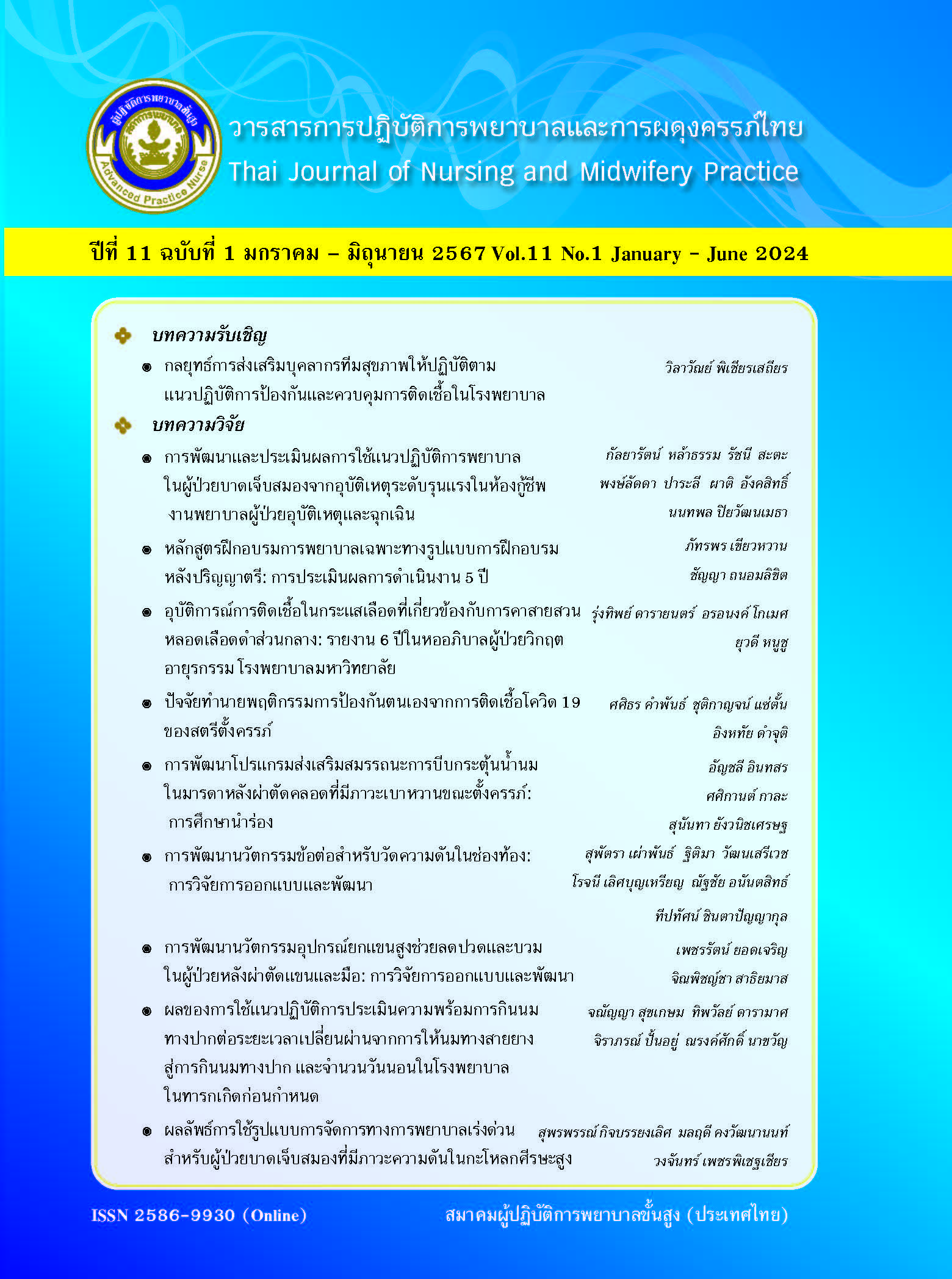Post Baccalaureate Residency Training Program: An Evaluation of 5-year Performance
Main Article Content
Abstract
This retrospective and cross-sectional study aimed to evaluate the post baccalaureate residency training program using the evaluation frameworks of Stufflebeam’s CIPP Model and Kirkpatrick’s Model. Retrospective data covering the period from 2018 to 2023 were gathered from the program’s database, involving 422 participants. Additionally, cross-sectional descriptive data using questionnaire were collected from 291 respondents, including nursing administrators, unit-based clinical nurse educators, and nurse preceptors. Statistical analyses included descriptive statistics, ANOVA, and paired t-tests. The findings regarding program context, input, and processes consistently revealed a high to exceptionally high level of appropriateness. In terms of program products, trainees reported moderate to high levels of satisfaction. All participants successfully met competency standards in their respective specialties, achieving a 100% pass rate. Post-training, there was a significant improvement in specialized nursing competencies, and this positive trend persisted at the 6-month follow-up, with statistically significant changes in behavior (p < .05). Job confidence levels showed a substantial increase, while job-related stress significantly decreased (p < .05). The findings of this study can serve as initial data for nursing departments seeking to collaborate with educational institutions in the planning for appropriate curriculum development by considering factors such as context, input, processes, and outcomes.
Downloads
Article Details

This work is licensed under a Creative Commons Attribution-NonCommercial-NoDerivatives 4.0 International License.
References
International Council of Nurses. International Council of Nurses guidelines on Advanced Practice Nursing 2020. Geneva: International Council of Nurses; 2020.
Thailand Nursing and Midwifery Council. Post Baccalaureate Residency Training [Internet].2019 [cited 2023 Oct 30]. Available from: https://www.tnmc.or.th/images/userfiles/files/Residency Training2562.pdf. Thai.
Bratt M. Nurse Residency Program: Best practice for optimizing organizational success. J Nurses Prof Dev. 2013; 29(3): 10210-. doi: 10.1097/NND.0b013e318292649f.
Duchscher JB. A process of becoming: The stages of new nursing graduate professional role transition. J Contin Educ Nurs. 2008; 39(10): 441-50. doi: 10.3928/00220124-20081001-03.
Stufflebeam DL. The CIPP Model for program evaluation. In: Madaus FF, Scriven M, Stufflebeam DL, editors. Evaluation models: Viewpoints on educational and human services evaluation. Norwell: Kluwer; 1983. p.117-41.
Frye AW, Hemmer PA. Program evaluation models and related theories: AMEE Guide No. 67. Med Teach. 2012; 34(5): e288-99. doi: 10.3109/0142159X.2012.668637.
Alsalamah A, Callinan C. Adaptation of Kirkpatrick’s four-level model of training criteria to evaluate training programmes for head teachers. Educ Sci. 2021; 11(3): 116. doi: 10.3390/educsci11030116.
Gandomkar R. Comparing Kirkpatrick’s original and new model with CIPP evaluation model. J Adv Med Educ Prof. 2018; 6(2): 94-5.
Kirkpatrick J, Kirkpatrick W. An introduction to the new world Kirkpatrick model. Georgia: Krikpatrick Partners, LLC; 2019.
Lee SY, Shin JS, Lee SH. How to execute Context, Input, Process, and Product evaluation model in medical health education. J Educ Eval Health Prof. 2019; 16: 1-8. doi: 10.3352/jeehp.2019.16.40.
Mellor P, Gregoric C, Atkinson LM, et al. A critical review of transition-to-professional-practice programs: Applying a standard model of evaluation. J Nurs Regul. 2017; 8(2): 23-30. doi: 10.1016/S2155-8256(17)30095-9.
Yamane T. Statistics: An introductory analysis. 3rd ed. New York: Harper & Row Ltd.; 1973.
The Healthcare Accreditation Institute (Public Organization). Hospital and healthcare standard. 5th ed. Bangkok: Kor Karn Pim Thien Kwang Co.Ltd; 2022. Thai.
Carlisle B. Supporting Nurse Residency Programs by determining nurse residency value [MSN Capstone Projects. Paper 187]. Texas: University of Texas at Tyler; 2022.
Williams FS, Scott ES, Tyndall DE, et al. New nurse graduate residency mentoring: A retrospective crosssectional research study. Nursing Economics. 2018; 36(3): 121-7.
Szarejko K, Burns H. The nurse residency education navigator: Educator, facilitator, and clinician. J Contin Educ Nurs. 2021; 52(2): 79-84. doi: 10.3928/00220124-20210114-07.
Thanomlikhit C, Khewwan P. Nurse residency coordinator: The role in nursing competency development. TJNMP. 2018; 5(2): 96-110. Thai.
Brunt BA, Morris MM. Nursing professional development [Internet]. [Updated 2022 Sep 20]. In: StatPearls Treasure Island (FL): StatPearls Publishing; 2023 Jan-. Available from: https://www.ncbi.nlm.nih.gov/books/NBK531482/


